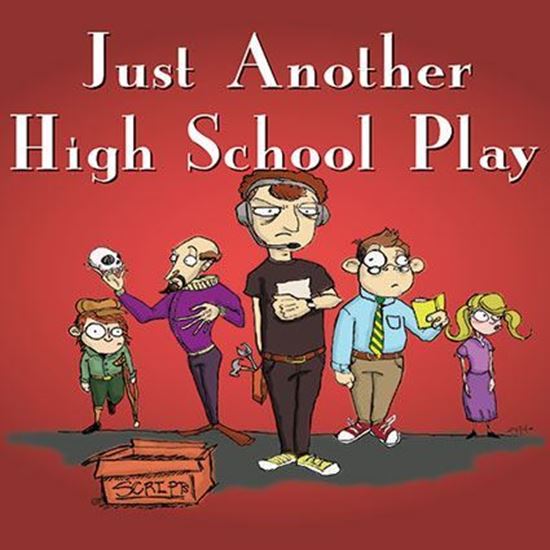
Just Another High School Play - The Updated Best-Selling Classic!
The Updated Best-Selling Classic!
Here's a comedy that covers nearly every angle of the typical high school play with a dose of history and improvisation thrown in for good measure! A group of actors, who have apparently been abandoned by their drama teacher, have to fend for themselves opening night in front of a live audience. In this hilarious metatheatrical comedy, a desperate Stage Manager and an overly confident Assistant Director (who has "never actually seen a play but has great ideas") attempt to cobble together a production using whatever scripts they can find backstage. What follows is a rollicking show full of physical comedy, gags, and satirical re-writings of many classic works, from Shakespeare to Thornton Wilder. The next time your high school wants to do a play, do them all... in under 90 minutes! This play offers opportunities for audience participation, plus it includes a part for your drama teacher.
Featuring flexible casting for 10-40 performers, this show can be customized for your community with local references and inside jokes. Perfect for both experienced performers and first-time actors, "Just Another High School Play" celebrates everything that makes high school theater both maddening and magical.
Warning: May contain traces of glitter that will never fully leave your stage.
Performance time is approximately 90 minutes. Rubber chickens not included.
Productions
Behind The Scenes
Since its 2005 debut this beloved show has been performed more than a thousand times, and now it's been completely reimagined for today's students. Favorite sequences like the history of theater and the improv game remain, but they've been refreshed with contemporary references. New additions include a unique take on the Salem witch trials to Twelve Angry Men performed by just two sort of angry actors. The Assistant Director's phone becomes a character in itself, with Siri and Alexa constantly interrupting scenes with misunderstood commands and poorly timed suggestions. This creates a brilliant parallel to the original play’s theme of theatrical chaos while reflecting our current relationship with technology. This version also features commercial parody breaks between scenes offer both practical scene transition time and fresh comedic opportunities and provide excellent opportunities for ensemble members to shine and keep the energy high throughout the show. The commercials also offer natural spots for directors to add local references and contemporary jokes that will resonate with their specific community. Whether you're revisiting the show after directing the original or discovering it for the first time, this version offers the perfect blend of classic comedy and contemporary relevance that will have both performers and audiences thoroughly entertained.
What inspired you to write this play?
Back in 2005, I noticed high school theater programs were desperately searching for fresh material that truly spoke to their students. The idea came from watching countless drama clubs tackle the same challenges - forgotten lines, missing props, tech week disasters - and realizing there was wonderful comedy in these shared experiences. Twenty years later, while technology and trends have changed dramatically (from MySpace to AI assistants!), the beautiful chaos of high school theater remains wonderfully timeless. This 20th Anniversary Edition was inspired by the desire to maintain everything that made the original connect with thousands of performers while updating it for today's students.
What's your favorite part or line in the play? Why?
I particularly love the running gag with the AI assistants (Siri and Alexa) constantly interrupting at the worst possible moments. It perfectly captures both our current relationship with technology and the way everything that can go wrong in theater usually does! But I also have a soft spot for the Drama Teacher's arc, from abandoning the show to pursue their "true calling" as a mini-golf instructor in Mexico to the final reveal that they were locked in the prop closet the whole time (where they did, admittedly, perfect their windmill shot).
Where did the characters come from? Are they based on people you know?
The Stage Manager and Assistant Director were inspired by every student stage manager who's had to hold a show together while dealing with an enthusiastic but clueless assistant who "took this job because I like to boss people around." The characters represent different aspects of theater students I've encountered: the over-dramatic actor who needs to make every death scene epic, the tech crew member who thinks adding strobe lights to Oklahoma! is "artistic vision," and the dedicated drama teacher who somehow maintains their sanity through it all. They're composites of the wonderful, weird, and passionate people who make high school theater so special.
What did you try to achieve with this play?
The goal was to create a love letter to high school theater that celebrates both its triumphs and disasters. I wanted to give drama programs a flexible show that could be customized for their community, accommodate casts of 10-40 performers, and provide opportunities for both experienced actors and newcomers. The play intentionally breaks the fourth wall and embraces its meta-theatrical nature to comment on the whole high school theater experience. Most importantly, I wanted to create something that would make audiences laugh while giving performers the time of their lives creating controlled chaos on stage.
Do you have anything else you'd like to add?
While updating this show for 2025, I was careful to maintain its core spirit while making it relevant for today's students. The new elements - like the AI assistants and social media references - reflect our current world, but the heart of the show remains the same. It's still about celebrating everything that makes high school theater both maddening and magical. Break a leg!
